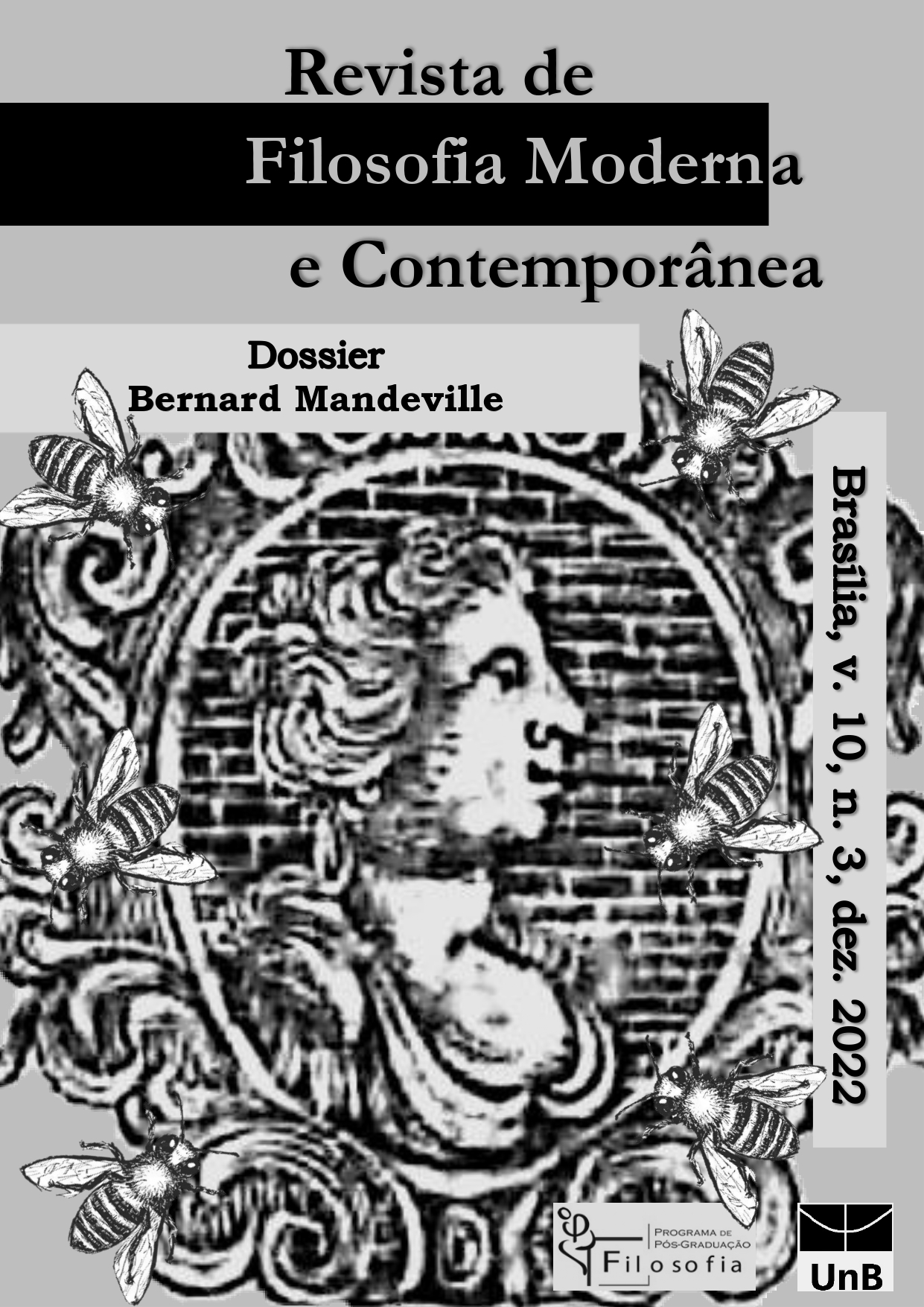Bernard Mandeville: A Riqueza além do Vício e da Virtude
DOI:
https://doi.org/10.26512/rfmc.v10i3.49607Palavras-chave:
Bernard Mandeville. Riqueza. Virtude. Sociedade comercial.Resumo
Bernard Mandeville denunciou a filosofia moral de seu tempo, tanto suas dimensões teóricas quanto práticas, como elitista e contrária à natureza humana. As explicações e recomendações derivadas dessa filosofia moral, segundo Mandeville, eram inadequadas para entender e governar a sociedade comercial. Mandeville examinou as explicações existentes sobre a natureza humana, confrontou-as com o que apresentou como fatos e desvendou suas contradições. Isso leva ao desafio de Mandeville: aceitar as coisas como elas são ou assumir a responsabilidade da transformação. Este é o desafio que pretendo explorar neste artigo. Podemos continuar vivendo em uma sociedade altamente desigual baseada no orgulho e na vergonha ou podemos criar incentivos que levem a um cálculo diferente das paixões de acordo com um critério utilitário.
Downloads
Referências
CHALK, A.F. “Mandeville’s Fable of the Bees: A Reappraisal” in Southern Economic Journal, 33:1, pp.1-16, reprinted in M. Blaug (ed.) Preclassical Economists, Volume III, John Law (1671-1729) and Bernard Mandeville (1670-1733), Aldershot: Edward Elgar Publishing, 1991 [1966], pp.149-164.
BERKOVSKI, S. “Mandeville on self-liking, morality, and hypocrisy”, Intellectual History Review, 32:1, 2022, pp.157-178.
DANG, A-T. “Technological Change and Economic Dynamics from the Scottish Enlightenment to Contemporary Evolutionary Economics”, Journal of the History of Economic Thought, 38:2, 2016, pp.211-228.
DOUGLASS, R. “Bernard Mandeville on the Use and Abuse of Hypocrisy”, Political Studies, 70:2, 2022, pp.465-482.
————— “The dark side of recognition: Bernard Mandeville and the morality of pride”, British Journal for the History of Philosophy, Ahead-of-Print, 2021, pp.1-17.
FACCARELLO, G. “Les fondements de l’économie politique libérale: Pierre de Boisguilbert”, in A. Béraud et G. Faccarello (dirs), Nouvelle histoire de la pensée économique. Volume 1: Des scolastiques aux classiques. Paris: La Découverte, 1992, pp. 154-175.
HORNE, T. A. The Social Thought of Bernard Mandeville. Virtue and Commerce in Early Eighteenth Century England. New York: Columbia University Press, 1978.
HURTADO, J. “‘Vicios privados, beneficios públicos’ o la diestra administración de un legislador utilitarista” Lecturas de Economía, 61, 2004a, pp.70-98.
———— La philosophie économique de Jean-Jacques Rousseau, Adam Smith et Jeremy Bentham à la lumière de Bernard Mandeville, Thèse pour obtenir le grade de Docteur en Sciences économiques, sous la direction de M. le Professeur Arnaud Berthoud, Université Paris X Nanterre, 2004b.
LALLEMENT, J. “Économie politique et morale: l’héritage de Mandeville” in: Économies et Sociétés, Série OEconomie, Histoire de la pensée économique, 18:12, 1993, pp.11-31.
LUBAN, D. “Bernard Mandeville as moralist and materialist”, History of European Ideas, 41, 2015, pp.831-57.
MANDEVILLE, B. The Fable of the Bees or Private Vices, Publick Benefits, 2 vols. With a Commentary Critical, Historical, and Explanatory by F.B. Kaye, Indianapolis: Liberty Fund. Available at: http://oll.libertyfund.org/titles/1863. 1988.
MAXWELL, J. C. “Ethics and Politics in Mandeville”, in: Philosophy, XXVI: 98, 1951, pp.242-252.
PENDERGAST, R. “Knowledge, innovation and emulation in the evolutionary thought of Bernard Mandeville”, Cambridge Journal of Economics, 38:1, 2014, pp.87-107.
PICCHIO, A. “Needs and Passions of Human Subsistence in the Moral Economy of the Early 18th Century: Defoe and Mandeville”, in: History of Economic Ideas, XI:2, 2003, pp. 7-29.
SCOTT-TAGGART, M. J. “Mandeville: Cynic or Fool?”, Philosophical Quarterly, 16:64, 1966, pp. 221-231.
SMITH, A. An Inquiry into the Nature and Causes of the Wealth of Nations, R.H. Campbell & A.S. Skinner general editors, Indianapolis: Liberty Fund, 1976 [1776].
STEINER, P. “Marchands et princes. Les auteurs dites ‘mercantilistes’” In. A. Béraud and G. Faccarello (dirs.) Nouvelle histoire de la pensée économique. Des scolastiques aux classiques. Tome I. Paris: Éditions La Découverte, 1992, pp.95-140.
SUSATO, R. “An ‘Ingenious Moralist’: Bernard Mandeville as a Precursor of Bentham”, Utilitas, 32:3, 2020, pp.335-349.
TOLONEN, M. Mandeville and Hume: Anatomists of Civil Society. University of Oxford, Voltaire Foundation, 2013.
VERBURG, R. “The Dutch background of Bernard Mandeville’s thought: escaping the Procrustean bed of neo-Augustinianism”, Erasmus Journal for Philosophy and Economics, 9:1, 2016, pp.32-61.
Viner, J. (1991). “Introduction to Bernard Mandeville A Letter to Dion (1723)” in D.A. Irwin (ed.), Jacob Viner. Essays on the Intellectual History of Economics. Princeton: Princeton University Press, pp.176-188.
Downloads
Publicado
Como Citar
Edição
Seção
Licença
Copyright (c) 2022 Revista de Filosofia Moderna e Contemporânea

Este trabalho está licenciado sob uma licença Creative Commons Attribution-NonCommercial-NoDerivatives 4.0 International License.
Direitos Autorais para artigos publicados nesta revista são do autor, com direitos da primeira publicação para a revista. Em virtude dos artigos aparecerem nesta revista de acesso público, os artigos são de uso gratuito, com atribuições próprias, em aplicações educacionais e não-comerciais.


